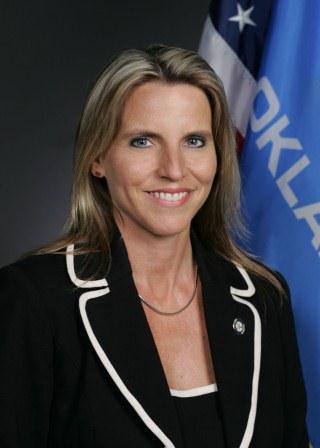In order to provide equal access and equal opportunity to people with diverse abilities, this site has been designed with accessibility in mind. Click here to view
Senate panel examines foster kids who age out of system/homeless teens
 Sen. AJ Griffin
Sen. AJ Griffin
About 300 to 400 Oklahoma children in state custody age out each year when they turn 18many are unprepared for this sudden transition. On Thursday the Senate Health and Human Services Committee held the first of two hearings examining how rules and procedures impact children in state custody, as well as looking at the issue of homeless teens in Oklahoma.
State Sen. AJ Griffin, R-Guthrie, requested the interim study. Griffin, who spent 15 years working with children in state custody, has first-hand knowledge of the subject. She said that for children, being forcibly removed from their home is the most intrusive thing government can do. Griffin said its important to understand how public policy impacts those children after theyre in state custody.
These children have little due process and few rights. The very policies meant to protect foster children may actually hinder their ability to develop the life-skills necessary to become independent adults, Griffin said. This is not about expanding government. This is about taking an honest look at those policies and the resources that are available and learning more about how Oklahoma can do a better job of ensuring these children can succeed once they age out of custody.
Jim Walker is the executive director of the Youth Services of Tulsa (YST), an organization that uses private funds to help provide shelter care as well as transitional housing to help homeless teens and those who have aged out of state custody to gain independence. The organization also offers outreach services to homeless youths. Walker noted some foster children do qualify for free tuition and books if they want to go to college, but explained that only addresses a part of what is needed.
Only a third of our kids that age out of foster care have a high school diploma or a GED, Walker said. The kids were seeing through our outreach programs are ones that dont have a clue, and dont have a diploma. Many times they dont have a birth certificate or a social security card. You cant do much of anything without those, Walker said. Every weekwe pay for and get them those documents so that they can move on or at least have a beginning. There is a huge need. Its not only in Tulsa, its across the state.
Removed from his family at two months old, Robert Reed, from Lawton, is now 19 and is a client of YST. Robert told members he lived in more than 30 foster homes. Despite having no high school diploma, when he reached 18, his services abruptly ended.
They told me, your bags are in the backdo you have anybody that you need to call, Robert recalled. And Im like, anybody I need to call? You all took me away from my mom and dad. I dont know what they look like. I dont have nobodywhat are you talking about? Well, thats all we can say.
Jessica Mitchell was not a foster child, but her mothers mental and physical health issues caused them to become homeless. She said she had no idea there were services like transitional housing until she wound up in a YST shelter.
When youre in that type of situation, you are preyed on. You are vulnerable. You see the absolute worst in human nature, especially being a female, Mitchell said. Youre just completely thrown out there. I think thats the thing thats really hard is just realizing that for not only myself but for a lot of these kids, there jst no safety net.
With the help of YST, Mitchell was able to complete her education and now works with youths who face similar situations to hers.
Representatives from the Youth and Family Services program of El Reno as well as Lions Club Boys Ranch in Perkins also talked to committee members about the challenges facing teens who age out of state custody, as well as the complications service providers face in trying to assist the population.
One huge issue is the government rules these programs must follow are supposed to ensure safety and well-being, but they often end up causing even more problems, Griffin said. Nationwide, we know that kids who have been in foster care are actually more likely to go to prison than to college. Obviously, something is very wrong.
The second and final hearing for Griffins interim study will be held in October.
 Oklahoma Senate
Oklahoma Senate

